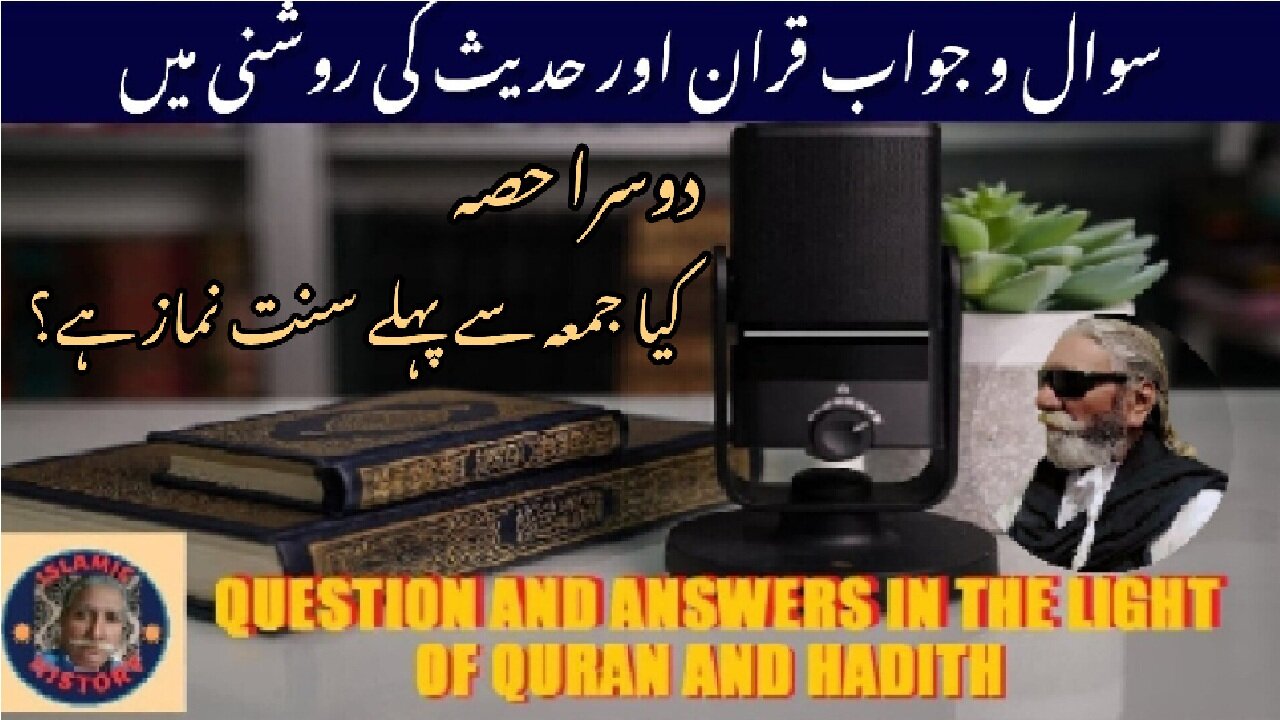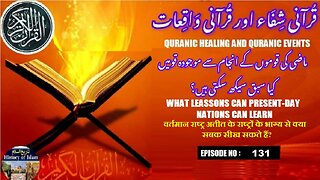Premium Only Content

Part-2 | Is There Sunnah Prayer before Jummah?
@islamichistory813 #sunnahprayerbeforejummah
“Chapter on innovations of Jumu`ah
People usually pray between the two adhans on Friday, offering supererogatory prayers of two or four Rak`ahs, and so on, until the Imam comes out. That is permissible and it is not a problem from the point of view of it being prayer. Rather the problem is what the common folk and most of those who think of themselves as knowledgeable believe, that it is a Sunnah prayer before Jumu`ah, as they pray Sunnah before Dhuhr, and they declare their intention that it is the Sunnah of Jumu`ah, and offer their own reasoning for this view, based on the idea that if we say that Jumu`ah is a shortened form of Dhuhr, then it has the same as Dhuhr (Sunnah prayers before and after, and so on).
None of that is based on a proper examination of the issue. There is no Sunnah before Jumu`ah, like ‘Isha’ and Maghrib, and also like ‘Asr according to one opinion, which is the correct opinion according to some of them. It is a prayer that is like no other, with its own merits.
The evidence that there is no Sunnah before it is that what is meant when we describe a prayer as being “Sunnah” is that it is based on words or actions narrated from the Messenger of Allah (blessings and peace of Allah be upon him). There is no report from the Prophet (blessings and peace of Allah be upon him) to indicate that the prayer before Jumu`ah is Sunnah, and it is not possible to draw an analogy between prayers.
However, when it comes to praying after Jumu`ah, it is narrated that the Prophet (blessings and peace of Allah be upon him) used to pray two Rak`ahs after Jumu`ah. (Narrated by Al-Bukhari (937) and Muslim (882) from the ?adith of Ibn ‘Umar (may Allah be pleased with him)) and that he said: “Whoever among you wants to pray after Jumu`ah, let him pray four (Rak`ahs) (Narrated by Muslim, 881). Abu ‘Eesa At-Tirmidhi (may Allah have mercy on him) said: It was narrated from ‘Ali ibn Abu Talib (may Allah be pleased with him) that he instructed people to pray two Rak`ahs then four after Jumu`ah. ‘Ata’ said: I saw Ibn ‘Umar (may Allah have mercy on him) praying two Rak`ahs after Jumu`ah, then he prayed four after that.
If you say: At-Tirmidhi also narrated from Ibn Mas`ud (may Allah be pleased with him) that he used to pray four Rak`ahs before Jumu`ah and four afterwards, and this was the view of An-Nawawi and Ibn Al-Mubarak (may Allah have mercy on them), so this indicates that there is a Sunnah prayer before it of four Rak`ahs, as is also the case with Dhuhr.
My response is: what is meant by `Abdullah ibn Mas`ud praying four Rak`ahs before Jumu`ah is that he used to do that voluntarily until the Imam came out, as we have mentioned above. How do you know that he believed that it was the Sunnah prayer of Jumu`ah?
More than that was narrated from others among the Companions (may Allah be pleased with them). Abu Bakr ibn Al-Mundhir said: We narrated from Ibn `Umar (may Allah be pleased with him) that he used to pray twelve Rak`ahs before Jumu`ah. It was narrated from Ibn `Abbas (may Allah be pleased with him) that he used to pray eight Rak`ahs. This indicates that they did this as something voluntary on their own initiative, without any instructions from the Prophet (blessings and peace of Allah be upon him), hence the variation in the numbers (of Rak`ahs) narrated from them. The matter of voluntary prayers is broad in scope. And perhaps they did that, or most of it, before the Adhan and the onset of the time for Jumu`ah, because they used to come early and pray until the Imam came out.
They used to do something similar in the case of Eid prayer, and it is definitively known that there is no Sunnah prayer connected to the Eid prayer. They used to pray after the sun had risen high, either in the prayer place or in their houses, then they would offer the Eid prayer. That was narrated from a number of the Companions and Tabi`un, and Al-Bayhaqi devoted a chapter to that in his Sunan.
Moreover the evidence that this is correct is the fact that the Prophet (blessings and peace of Allah be upon him) used to come out of his house on Friday and ascend his minbar, then the Mu’adhdhin would give the call to prayer, and when he had finished the Prophet would start his Khutbah. If there were any Sunnah prayer before Jumu`ah, he would have told them to pray Sunnah after the Adhan and he would have done it himself. At the time of the Prophet (blessings and peace of Allah be upon him), there was only this Adhan immediately before the Khutbah, and that is the Maliki Madhhab until the present day.
If you were to say: perhaps he (blessings and peace of Allah be upon him) offered the Sunnah prayer in his house after the sun passed the zenith, then he came out? I would say: If he did that, his wives (may Allah be pleased with them) would have narrated it from him as they narrated all other prayers that he did in his house by night and by day, and the way in which he prayed Qiyam Al-layl. As no such thing has been narrated, the basic principle is that it did not happen and that it was not prescribed. End quote.
This issue was discussed further and at length by Imam Abu Shamah (may Allah have mercy on him).” (See Al-Ba`ith `ala Inkar Al-Bida` wa’l-Hawadith, p. 96 ff)
To sum up, there is no regular Sunnah prayer prescribed before Jumu`ah; rather what is prescribed is to offer whatever voluntary prayers one wants, from the time one enters the mosque until the Imam ascends the pulpit.
And Allah knows best.
==========================================
-
 7:39
7:39
ISLAMIC HISTORY
13 hours agoWhat lessons can present-day nations ماضی کی قوموں کے انجام سے موجودہ قومیں کیا سبق سیکھ سکتی ہیں؟
5 -
 LIVE
LIVE
Cripiechuccles
2 hours ago😁💚💙MOTA MONDAY WITH CRIPIE💚💙 👌SMOKING, GAMING & WATCHING FLICKS!:😁
63 watching -

Stephen Gardner
1 hour ago🔥'Burn ALL TRUMP FLAGS’ says Tim Walz + Democrat CAUGHT rigging own election!
2192 -
 10:10
10:10
robbijan
1 day agoHollywood’s Hidden Messages: Predictive Programming & What’s Next
1.13K8 -
 40:13
40:13
MattMorseTV
2 hours ago $3.62 earned🔴It's EVEN WORSE than we thought...🔴
12K56 -
 LIVE
LIVE
MissesMaam
4 hours agoDying Light w/ Da Bois💚✨
88 watching -
 LIVE
LIVE
Sgt Wilky Plays
1 hour agoThe Finals with the Pack
42 watching -
 32:55
32:55
Clickbait Wasteland
9 hours ago $0.21 earnedAsking New Yorkers Who They Support For Mayor: Wall Street
3.29K1 -
 LIVE
LIVE
Spartan
1 hour agoLittle bit of Halo and Expedition 33
13 watching -
 LIVE
LIVE
Fragniac
3 hours ago🔴LIVE - FRAGNIAC - THE FINALS w/ The @BrrrapPack❗ ( -_•)╦ ╤─💥
20 watching